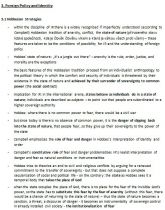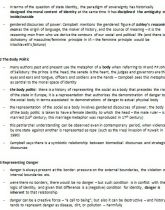Hledej
Zobraz:
Univerzity
Kategorie
Rozšířené vyhledávání
12 662
projektů
Home » Studijní materiál » Writing Security: United States Foreign Policy and the Politics of identity
Writing Security: United States Foreign Policy and the Politics of identity
| Přípona .doc |
Typ studijní materiál |
Stažené 0 x |
| Velikost 0,1 MB |
Jazyk český |
ID projektu 9381 |
| Poslední úprava 09.01.2017 |
Zobrazeno 1 224 x |
Autor: clean.bandit |
 Sdílej na Facebooku
Sdílej na Facebooku |
||
| Detaily projektu | ||
- Cena:
6 Kreditů - kvalita:
84,2% -
Stáhni
- Přidej na srovnání
- Univerzita:Univerzita Karlova v Praze
- Fakulta:Fakulta sociálních věd
- Kategorie:Humanitní vědy » Politologie
- Předmět:Mezinárodní vztahy
- Studijní obor:-
- Ročník:3. ročník
- Formát:MS Office Word (.doc)
- Rozsah A4:5 stran
3. Foreign Policy and Identity
3.1 Hobbesian Strategies
- within the discipline of IR there is a widely recognized if imperfectly understood (according to Campbell) Hobbesian tradition of anarchy, conflict, the state of nature (přirozeného stavu lidské společnosti, kde je člověk člověku vlkem a která je válkou všech proti všem) - these features are taken to be the conditions of possibility for IR and the understanding of foreign policy
- Hobbes’ state of nature: „it’s a jungle out there“ - anarchy is the rule; order, justice, and morality are the exceptions
- the basic features of this Hobbesian tradition proceed from an individualist anthropology to the political theory in which the comfort and security of individuals is threatened by their existence in the state of nature and achieved by their surrender of sovereignty to common power (the social contract)
- implication for IR: in the international arena, states behave as individuals do in a state of nature; individuals are described as subjects - to point out that people are subordinated to a higher sovereign authority
- Hobbes: where there is no common power to fear, there would be a civil war
- but since today is there is no absence of common power, it is the danger of slipping back into the state of nature, that people fear, so they give up their sovereignty to the power of the state
3.1 Hobbesian Strategies
- within the discipline of IR there is a widely recognized if imperfectly understood (according to Campbell) Hobbesian tradition of anarchy, conflict, the state of nature (přirozeného stavu lidské společnosti, kde je člověk člověku vlkem a která je válkou všech proti všem) - these features are taken to be the conditions of possibility for IR and the understanding of foreign policy
- Hobbes’ state of nature: „it’s a jungle out there“ - anarchy is the rule; order, justice, and morality are the exceptions
- the basic features of this Hobbesian tradition proceed from an individualist anthropology to the political theory in which the comfort and security of individuals is threatened by their existence in the state of nature and achieved by their surrender of sovereignty to common power (the social contract)
- implication for IR: in the international arena, states behave as individuals do in a state of nature; individuals are described as subjects - to point out that people are subordinated to a higher sovereign authority
- Hobbes: where there is no common power to fear, there would be a civil war
- but since today is there is no absence of common power, it is the danger of slipping back into the state of nature, that people fear, so they give up their sovereignty to the power of the state
Klíčová slova:
foreign policy
identity
body politic
representing danger
moral space
Obsah:
- 3. Foreign Policy and Identity
3.1 Hobbesian Strategies
3.2 Foreign Policy: War, the State, and Man
4. Foreign Policy and Difference
4.1 The Moral Space of Identity
4.2 The Body Politic
4.3 Representing Danger

